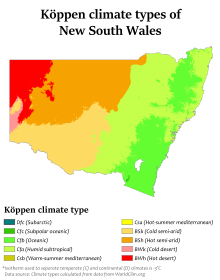The following is an outline and topical guide to New South Wales:
Contents
- General reference
- Geography of New South Wales
- Regions and subregions
- Natural disasters
- Government and politics of New South Wales
- Electoral districts
- History of New South Wales
- Cities
- Culture of New South Wales
- Sports in New South Wales
- Symbols of New South Wales
- See also
- References
- External links

New South Wales (commonly abbreviated as NSW) is a state on the east coast of Australia. It borders Queensland to the north, Victoria to the south, and South Australia to the west. Its coast borders the Coral and Tasman Seas to the east. The Australian Capital Territory and Jervis Bay Territory are enclaves within the state. New South Wales' state capital is Sydney, which is also Australia's most populous city. [1] In December 2023 [update] , the population of New South Wales was over 8.3 million, [2] making it Australia's most populous state. Almost two-thirds of the state's population, 5.3 million, live in the Greater Sydney area. [1]




